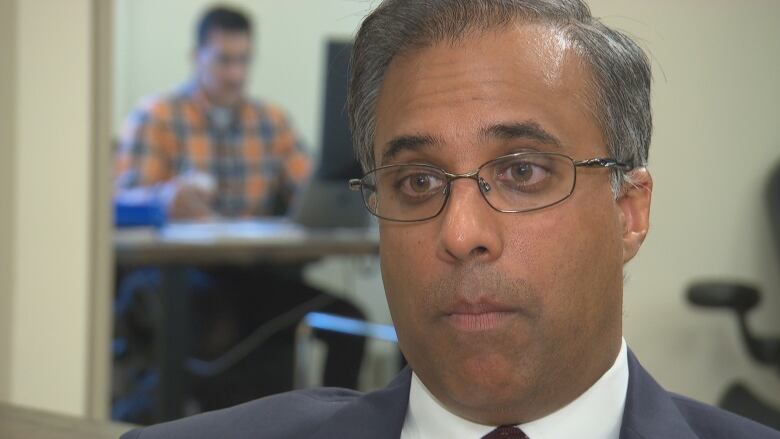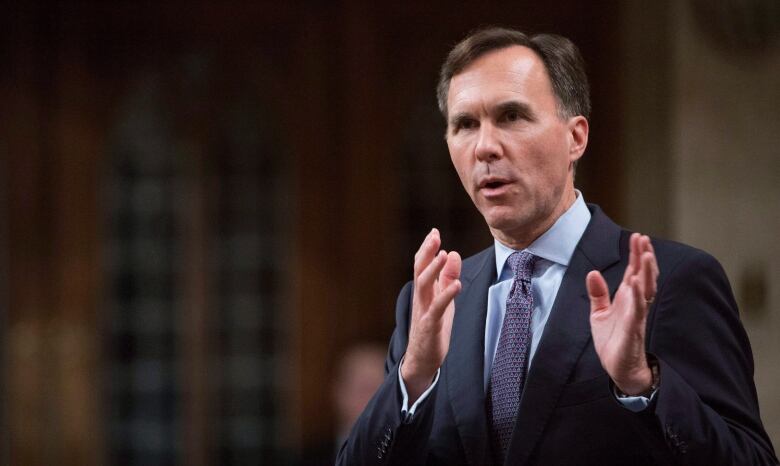Canadians' confidential tax info to be shared with police in other countries
Government shouldn't hide changes in the budget, says civil liberties advocate

Confidential information from Canadian taxpayers could soon be shared with police and authorities in three dozencountries around the world, under measures included in Finance Minister Bill Morneau'slatest budget.
In an inconspicuoussection tucked into a small 78-page annex to the budget, the government says it wants to give police and tax authorities new powers to fighttax evasion and advance international investigations into serious crimes, ranging from drug trafficking and money laundering to terrorism.
"The sharing of information internationally for the investigation, prosecution and suppression of serious criminal offences, both tax-related and non-tax-related, is vital to the global fight against serious crime and is consistent with the government's commitments to address global tax evasion and improve the fairness of the tax system," says the budget annex.
'Buried' in the budget
A civil liberties advocate accuses the government of using the budget to hide controversial changes.
"If you can get something buried in the budget that nobody knows about, sometimes you can get something passedwithout getting the kind of heat it deserves," said Michael Bryant, executive director of the Canadian Civil Liberties Association and a former Ontario attorney general.
"Well, this deserves a lot of heat from the opposition and scrutiny from media."

Bryant said the proposed changes risk affecting Canadians' civil liberties and should be introduced and debated as part ofa separate bill.
"The big concern is that Canada would be unwittingly participating in a star chamber investigation and prosecution of somebody in another jurisdiction, or that Canadians would in essence be thrown under the bus and information would be shared with other jurisdictions that don't have our due process and constitutional protections," he said.
Asked about the issueThursday, Finance Minister Bill Morneau said the provision is necessary to track potential tax evaders, money launderers and terrorist fundraisers.
"We are talking about people who are being accused, effectively, of crimes. So we are looking to make sure that we have a system that can deal with people who are doing things that are inappropriate in a way that respects all Canadians' rights and freedoms," he said.
"We do have a responsibility to make sure the international network of terrorist financing or money laundering is dealt with in a way that's appropriate to this challenge, which is big."
Enhanced powers
Three separate provisions outlined in the budget annex would enhance the powers of Canadian authorities to share confidential information about Canadian residents.
Currently, the Canada Revenue Agency can share confidential tax information about Canadians with authorities in other countries that are investigating serious cases, such as tax evasion. However, under Canadian law, the CRA cannot share that information with officials in another country investigating a crime other than tax evasion.
"While many of Canada's mutual legal assistance partners are able to share tax information in response to a request from Canada for mutual legal assistance, Canada lacks the legal authority to reciprocate," officials wrote in the budget annex.
That's about to change.

"Budget 2018 proposes to enable the sharing of tax information with Canada's mutual legal assistance partners in respect of acts that, if committed in Canada, would constitute terrorism, organized crime, money laundering, criminal proceeds or designated substance offences," says the document.
Canada currently has mutual legal assistance agreements with 35other countries or bodies, including the United States,Brazil, Belgium, France, Israel, Russia and China.
That means authorities in one of those countries investigating someone for a crime like money laundering or drug trafficking could apply to Canada for that person's tax records and obtain them.
The proposed new policy affects more than tax information.
While tax authorities in other countries can ask Canada for an individual's tax information, that policy currently doesn't extend to other information like bank account records. Under a second proposal, the government would allow the legal toolscontained in the Mutual Legal Assistance in Criminal Matters Actsuch as court orders to be used to obtain information being sought by another tax authority.
Policy gives police more access to tax information
"These tools include the ability for the Attorney General to obtain court orders to gather and send information," says the annex.
The government also plans to give Canadian police more access to tax information. Currently, police investigating certain crimes can obtain a court order to get income tax information. The government plans to extend that ability to access confidential information to the Excise Act, which taxes a variety of products, including tobacco and alcohol.
While the proposal was included in the budget documents, it does not require any government spending.
When asked by CBC News on budget day, Morneauread the provisionsbut was unable to explain them, referring questions to Finance Department officials. An adviser tothe Prime Minister's Office and an adviser to Morneaualsowere unable to answer questions about them.
A finance official later said the proposals originated with the Justice Department.
While the proposal was included in the budget, it will require the approval of Parliament before it can become law and be implemented. Finance Department spokesman JackAubrysaidit has not yet been decided whether the policy will be part of the budget implementation bill or some other piece of legislation.
The proposals, he said,are an extension of existing legal processes which include safeguards, such as the requirement that judges in such cases grant two court orders one to obtain the information and a second to permit sharing it with authorities in another country.

Sahir Khan, executive vice-president of the Institute of Fiscal Studies and Democracy,said the Canadian government traditionally hasbeen very careful about sharing confidential information.
Government stepping up fight against tax evasion
"I think Canadians should always care (about) their confidential taxpayer information, how it is being used and if it is being shared. It is always incumbent on the government to ensure that ... the information is treated confidentially and Canadians are aware how it might be used across the government if it ever breaches the silo of the tax department, or outside of the department but also outside of the country."
The proposals came as the government also announced measures to step up its fight against offshore tax evasion.
For example, the government plans to invest an extra $90.6 million over five years to address additional cases of tax evasion and aggressive tax avoidance and will provide $41.9 million more over five years to hire staff at the Tax Court of Canada.
The budget also contains measures to tighten up the rules surrounding foreign affiliates.
Elizabeth Thompson can be reached at elizabeth.thompson@cbc.ca
With files from the CBC's Kathleen Harris












_(720p).jpg)


 OFFICIAL HD MUSIC VIDEO.jpg)
.jpg)



























































































